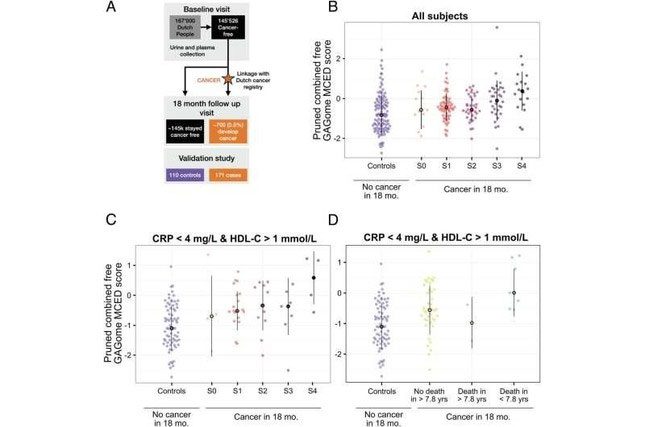An international study led by researchers from Chalmers University of Technology in Sweden has revealed a novel, previously untested method that can easily identify multiple types of newly formed cancers simultaneously, including those that are difficult to detect using comparative methods.
Cancer is one of the deadliest diseases worldwide, and it becomes increasingly challenging to treat when detected at advanced stages. Early detection significantly increases survival rates, yet currently, only a limited number of cancer types are routinely screened.
The search for effective methods for early detection of multiple cancers simultaneously (MCED) is an emerging field of research.

The range of scores and the line indicating the average standard deviation ± 1 of the scores in each group. Keywords: S0, stage 0 (carcinoma in situ)
Current screening tests are specific to individual types of cancer, meaning patients need to be tested separately for each type. Emerging MCED tests are often based on genetics, such as measuring DNA fragments from circulating tumors in blood. However, DNA-based methods can only detect certain types of cancer and may be limited in identifying tumors at the earliest stages, referred to as stage I.
A New Method Based on Human Metabolism
Researchers from Chalmers have now developed a new method for early detection of multiple cancers based on human metabolism.
The results have been published in the scientific journal PNAS, opening up new opportunities for cheaper and more effective cancer screening. In a study involving 1,260 participants, researchers first discovered that this new method could detect all 14 types of cancer that were tested. They further demonstrated that it could detect twice the number of stage I cancers in healthy asymptomatic individuals compared to emerging DNA-based MCED tests.
The study authors wrote: “This is an unexplored method, and thanks to our ability to test it on a large population, we can demonstrate its effectiveness in identifying more types of stage I cancers and a broader range of cancers. This includes cancers not currently screened for and those that cannot be detected by DNA-based MCED tests, such as brain tumors and kidney cancer.”
Cheaper and More Practical Tests
This method is based on discoveries made by Dr. Francesco Gatto and Professor Jens Nielsen at Chalmers nearly a decade ago: the so-called glycosaminoglycans—a type of sugar that plays an important role in our metabolism—are excellent biomarkers for non-invasive cancer detection.
Researchers have developed a method that employs algorithms to identify changes indicative of cancer in glycosaminoglycan. This method utilizes a relatively small amount of blood or urine, making it more practical and cost-effective.
Francesco Gatto stated: “The simplicity of this method means that costs will be significantly lower, ultimately allowing more people to access and undergo the test.”
A Major Step Towards Effective Multi-Cancer Testing
In the next step, researchers hope to conduct a study with an even larger participant pool to further develop and validate the potential screening applications of the method.
Francesco Gatto remarked: “This is a groundbreaking study that gives us hope that one day society will be able to implement screening programs capable of early detection of all types of cancer.”
“To detect more cases of cancer early, we know that new tools are needed. These results are promising due to the higher sensitivity demonstrated for more types of stage I cancers, utilizing cost-effective and accessible technology,” said Dr. Eric Jonasch, MD, Professor at the MD Anderson Cancer Center of the University of Texas, USA, and co-author of the study.
The article “Non-invasive early detection of multi-cancer using glycosaminoglycans” by the researchers has been published in the scientific journal Proceedings of the National Academy of Sciences (PNAS).
Researchers have chosen to test 14 different types of cancer, representing a large majority of newly diagnosed cancers, and all 14 types could be detected using the new method. The study involved 1,260 participants, both healthy individuals and those previously diagnosed with cancer. With this new multi-cancer early detection method (MCED), it is possible to detect twice the number of cancers at the earliest stages (stage I) in asymptomatic healthy individuals compared to other DNA-based MCED tests currently under development.


















































